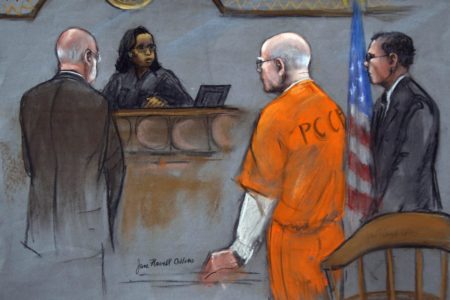So at the very end of his serial-killing life, Whitey Bulger was hoping “to get a peaceful death, one of those he Died in his Sleep kind.”
Rather than one of those “he Died Screaming and Yelling As Bullets Tore Him Apart kind” of deaths that Bulger dealt out by the score, or at least by the dozen.
I can’t get enough of Whitey’s final jailhouse letters, in that neat parochial-school Palmer Method cursive handwriting of his, about how he wants to begin the big sleep without being chained to “the black box” that’s supposed to keep jailbirds from fleeing.
“Would like to get one of those easy deaths,” he wrote. “Go in your sleep — no black box and hospital wouldn’t be an ordeal.”
You know what’s not an easy death — being machine-gunned on Northern Avenue after an FBI agent fingered you and a buddy for Whitey’s gangland gats. Or dying on Morrissey Boulevard in a) a hail of bullets in a gas-station phone booth, or b) driving to your 10-year-old daughter’s birthday party with a nice cake from Linda Mae’s.
These latest letters, from one of Whitey’s fellow octogenarian Alcatraz alumni, made my day, and not just if Whitey had gotten his way, I would certainly not have had my own “peaceful death” like the one he was fantasizing about for himself.
Despite being portrayed in movies by A-listers like Jack Nicholson and Johnny Depp, Whitey apparently never got the old Hollywood memo: “Self-pity is not good box office.”
Always he was complaining, whining, bitching. As his penitentiary pal told the Globe, “He told me three or four times in the past 18 months that he was having blackouts.”
Blackouts. Do you know what happens when you’re being strangled? You black out, right before you die. You know, kind of like 26-year-olds Deb Davis and Deb Hussey did when Whitey strangled both of them.
“A couple of times he felt sure he was dying.”
At least once, I’m pretty sure, Deb Davis and Deb Hussey felt like they were dying. Because they were.
What exactly constitutes a peaceful death? Is it peaceful when you’re shot in the back of the head as you walk down the stairs to the basement where Whitey is planning to bury you, as you’re wondering what’s going to happen to your sons, not knowing whether two of them will someday throw themselves in front of Red Line trains (which is what Bucky Barrett’s kids did).
How peaceful was death if you went out on the Bulger assembly line — your corpse stripped of its clothes, teeth pulled out with rusty pliers by Stevie Flemmi to foil identification, body tossed in a shallow grave covered with lime to hasten the decomposition of the flesh?
When Whitey planned the deaths of others, “peaceful” and “easy” were not two of his greater concerns. After the murder of John Callahan in Florida, the businessman’s body was dumped in the trunk of his Cadillac at the Miami airport. Whitey strenuously objected to the funeral arrangements.
“Don’t you have a boat?” he asked hitman John Martorano. “Why didn’t you take him out to sea in your damn boat, chop up his body and then feed him to the sharks?”
Whitey preferred to describe his own preferred death as peaceful, or at least easy. Which reminds me of one time he used the e-word when describing a death, actually a murder.
The late Jackie McDermott, who was eventually shot in the face by a cocaine cowboy named Billy Barnoski, was a Lowell bookie, and he laid off his bets to the Notarangeli brothers, Indian Al and Indian Joe, at least until they were liquidated in very unpeaceful fashion by Whitey et al.
Indian Joe was whacked in Medford Square, at the Pewter Pot, in the middle of the day in front of about a million witnesses. Winter Hill didn’t care.
After the, uh, hostile takeover, Jackie was summoned to Somerville by his new bosses, the Winter Hill Gang. After explaining the new facts of life to him, they asked Jackie if he had any questions. Only one, he said: Why’d you have to hit Indian Joe like that, in broad daylight?
Whitey answered the question.
“We wanted to show how easy it was.”
Easy for Whitey, not so easy for Indian Joe.
What goes around, comes around.


